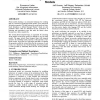112 search results - page 8 / 23 » On properties of theories which preclude the existence of un... |
LLC
2011
13 years 2 months ago
2011
Computational phonology studies sound patterns in the world’s languages from a computational perspective. This article shows that the similarities between different generative t...
SIGSOFT
2005
ACM
14 years 8 months ago
2005
ACM
Fluent model checking is an automated technique for verifying that an event-based operational model satisfies some state-based declarative properties. The link between the event-b...
WINE
2005
Springer
14 years 29 days ago
2005
Springer
The modeling of Internet quality of service (QoS) provisioning is a multidisciplinary research subject. From the viewpoint of game theory, we propose a model that combines QoS inde...
ISPDC
2005
IEEE
14 years 1 months ago
2005
IEEE
An important scheduling problem is the one in which there are no dependencies between tasks and the tasks can be of arbitrary size. This is known as the divisible load scheduling ...
JOLLI
2002
13 years 7 months ago
2002
Temporal logic can be used to describe processes: their behaviour is characterized by a set of temporal models axiomatized by a temporal theory. Two types of models are most often ...

